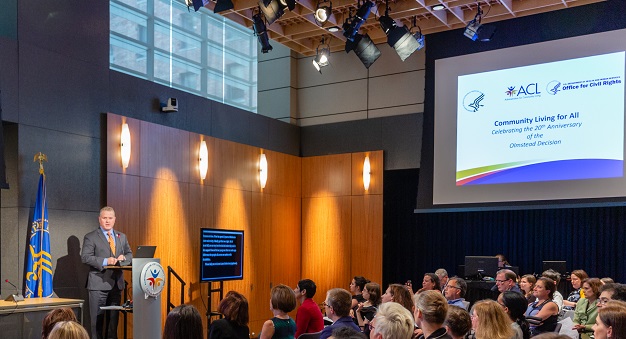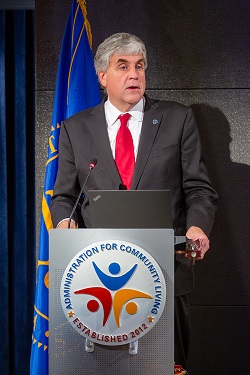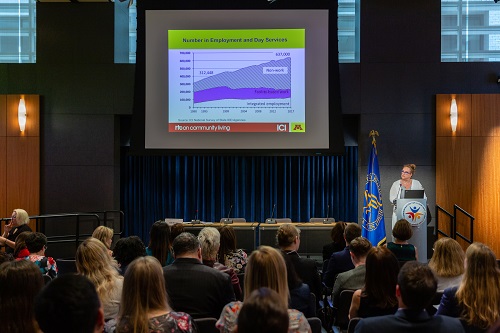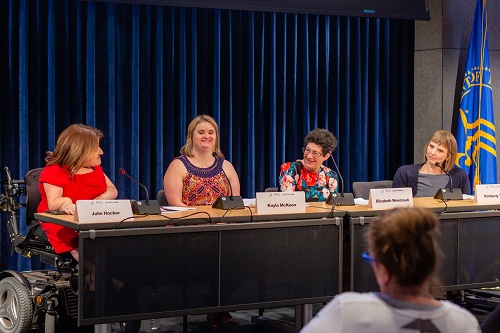
Twenty years ago, the U.S. Supreme Court ruled that separating and isolating people with disabilities from the rest of society is against the law under the Americans with Disabilities Act (ADA). The landmark case — Olmstead v. L.C. — has helped make it possible for many older adults and people with disabilities to live and participate in their communities.
On June 25, ACL and the HHS Office for Civil Rights (OCR) hosted an event in Washington, DC, to celebrate the last 20 years of progress and reflect on the work that still lies ahead.

OCR Director Roger Severino and HHS Deputy Secretary Eric Hargan kicked off the event. Severino talked about growing up in Los Angeles without much interaction with children with disabilities and how it created a sense of “otherness.” Though this “stigma and separation” was the norm – the unfortunate result of the policies and attitudes of the time, by the time he reached high school, things were beginning to change. Noting that people with and without disabilities have benefited from our society’s shift towards integration and inclusion, he reaffirmed OCR’s commitment to continuing that program.
Severino said, “equal treatment and human dignity, that’s what we fight for everyday at the Office of Civil Rights.”
Deputy Secretary Hargan talked about the impact of the Olmstead ruling, including increased community-based services, shifts in Medicaid spending, more employment opportunities, and advances in technology.
“Today, we recognize that community living should be the expectation for all people, and we are working to make that vision a reality,” Hargan said. “Olmstead wasn’t the first step on the path to where we are today, but Olmstead allowed us to leap forward and accelerate the pace of change.”
While celebrating the progress that has been made, Hargan reminded the audience that options and integration are still not a reality for all Americans. He called for a more complete view of health care based around a “continuum of support and care” that brings together the 'health' and 'human services' sides of HHS.

Amy Hewitt, director of the University of Minnesota’s Institute for Community Integration, an ACL grantee, talked about the state of community living today.
“Olmstead has changed the way we think about community living,” she noted. “It’s no longer enough to be living in the community -- it’s a matter of being of the community.”
She said data shows that more people with disabilities have access to, and are taking advantage of, community living options. She added that policies, such as the “Money Follows the Person” program, have helped. She said we should celebrate the uptick in rates of integrated employment while recognizing that more progress is needed. Looking to the future, she discussed supporting the direct service workforce, ensuring access to services for racial minorities and individuals with limited English proficiency, and addressing disparities in the quality and accessibility of services between states.
A panel of three self-advocates, moderated by ACL's Commissioner for the Administration on Disabilities Julie Hocker, helped to put faces to the policy shifts described by the other speakers. They talked about the impact of Olmstead and the ADA on their lives. They were each asked about what community living has meant to them personally, what they hope the next 20 years hold, and what needs to happen in employment.
Kayla McKeon, manager of grassroots advocacy for the National Down Syndrome Society and the first registered lobbyist with Down syndrome, said community living “is about making your own choice and having a support system at the same time.”
”Community living works for me because I have a voice that allows me to be independent,” she added.

In the next 20 years, Liz Weintraub, senior advocacy specialist for the Association of University Centers on Disabilities (AUCD), wants to see more people with “all kinds of disabilities as leaders in all jobs and careers,” including in elected office and holding leadership positions in business.
Kimberly Tissot, CEO of Able SC, a Center for Independent Living, wants to see more integrated services for people with disabilities. She also wants to see society’s perceptions around employment change from an attitude that people with disabilities cannot work to one where people with disabilities not only having jobs, but careers, working alongside able-bodied peers.
In addition to Severino, the audience also heard from two other federal partners who are playing key roles in implementing and enforcing Olmstead.
Melissa Harris, Acting Deputy Director for the Disabled and Elderly Health Programs Group at the Centers for Medicare & Medicaid Services (CMS), discussed the latest on the Home and Community-Based Settings rule, efforts to promote person-centered thinking and planning, and federal incentives for states to build the capacity of integrated home and community-based services for people with disabilities.
Eric Dreiband, Assistant Attorney General for the U.S. Department of Justice’s Civil Rights Division, reiterated that “disability rights are civil rights” as he discussed the department’s recent settlements and litigation to enforce Olmstead. He also highlighted DOJ’s work to promote competitive integrated employment.
“We all know that work can provide so much more than a paycheck,” he said. “It's a sense of purpose, dignity, independence, value, self-worth, and belonging.”
ACL Administrator Lance Robertson closed out the event, thanking everyone for their support and dedication to bettering the lives of people with disabilities.
“We’ve come a long way since the Olmstead decision, but we’re far from done,” said Robertson. “ACL is committed to seeing community living become a reality for every older adult and person with a disability who seeks it.”
View event materials, transcript, speaker bios, Olmstead background, and more.

